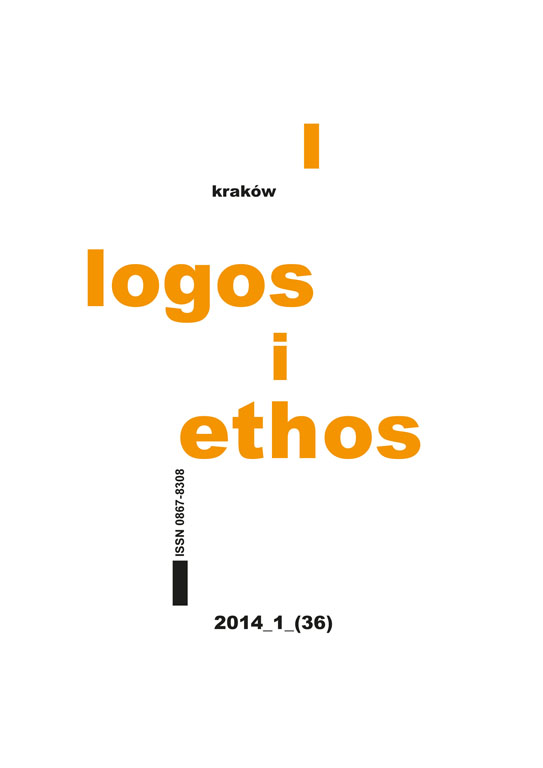Die Bedeutung des Willens und die Erfahrung des Sollens bei Immanuel Kant und Karol Wojtyła
DOI:
https://doi.org/10.15633/lie.32Słowa kluczowe:
Freedom, Kant, Wojtyła, person, will, self-determination, duty, ActAbstrakt
By the ignorance of the motives of the critical philosophy Kant’s, many interpreters see his aim not in the rescue, but in the destruction of metaphysics. Kant’s practical philosophy is often misunderstood, as long as the expositors deny the unconditional validity of the moral law, “the only factum of pure reason”. The article tries to point out the similarities (the importance of free will and the experience of duty) in the thinking of Karol Wojtyła and Immanuel Kant. The moral experience, the demand of duty of the categorical imperative (Kant), personalistic standard (Wojtyła), shows the importance of self-determination/will decision towards the human act. Although Wojtyła admits in his work „person and act“, that just the Kant studies have helped to emphasize the will as a self determining factor of the person and the primacy of the will to the feelings, there is no lack of interpreters who like to overemphasize the great influences of Thomism and phenomenology (such as Max Scheler) on the thinking of the Krakow philosopher. Many interpreters ignore the cantian approach without comment. The goal of the article is therefore at least begin to fill this glaring omission. Wojtyła’s and Kant’s thinking is determined by the question of the freedom of the people. In the practical affirmation of the possibility of free actions – in the deed – the morality and dignity of human, which points to the unconditional – God – immortality of man – is revealed. Also Wojtyła, in the sense of Kant, stresses that the mind itself and with its own power is unable to reach the deity and man must engage on the uncertainty and the abyss of faith, when he leaves the island of pure reason. For Wojtyła, the ability to free, responsible, self-determining act is a sign of the inviolability of personal dignity and for Kant (similar to Augustine and Thomas) a determination of each person to the realization of the highest good. The two thinkers see the people in the light of the experience of duty – commandment of love – that can materialize only through action and deed. For Kant, implicitly for Wojtyła also the deference to God is done explicitly by the act.
Bibliografia
Buttiglione R., Myśl Karola Wojtyły, Lublin 1996.
Feuerbach L., Grundsätze der Philosophie der Zukunft, [in:] ders., Kleine Schriften, Frankfurt a. M. 1966.
Fischer N., Vom Rang und vom Sinn der Gottesfrage in der Philosophie Kants, [in:] Die Gottesfrage in der Philosophie Immanuel Kants, Freiburg im Br. 2010.
Kasper W., Barmherzigkeit. Grundbegriff des Evangeliums – Schlüssel christlichen Lebens, Freiburg im Br. 2012.
Mruszczyk M., Człowiek w interpretacji adekwatnej Karola Wojtyły, Katowice 2010.
Rynkiewicz K., Von der Grundlegung der christlichen Ethik zur Grundlegung der philosophischen Anthropologie. Eine kritische Untersuchung zum Personbegriff bei Karol Wojtyła, Berlin 2002.
Waleszczuk Z., Die Person bei Immanuel Kant und Karol Wojtyła (w przygotowaniu).
Waleszczuk Z., Wolność osoby ludzkiej w ujęciu Karola Wojtyły i Immanuela Kanta, Wrocław 2014.
Winter A., Der andere Kant. Zur philosophischen Theologie Immanuel Kants, Hildesheim–Zürich–New York 2000.
Wojtyła K., Liebe und Verantwortung. Eine ethische Studie, München 1981.
Wojtyła K., Osoba i czyn, Kraków 1969.
Wojtyła K., Świętego Jana od Krzyża nauka o wierze, Lublin 2000.
Wojtyła K., Wykłady lubelskie, Lublin 2006.
Pobrania
Opublikowane
Numer
Dział
Licencja
Prawa autorskie (c) 2014 Zbigniew Waleszczuk

Utwór dostępny jest na licencji Creative Commons Uznanie autorstwa 4.0 Międzynarodowe.
Autorzy publikujący w czasopiśmie udzielają jego wydawcy zgody o następującej treści:
- Autor zachowuje autorskie prawa majątkowe do utworu, a jednocześnie udziela wydawcy czasopisma zgody na jego pierwszą publikację w wersji drukowanej i wersji online na licencji Creative Commons Uznanie autorstwa 4.0 Międzynarodowe oraz zgody na wykonywanie opracowań, w tym przekładów.
- Autor ma możliwość udzielania zgody niewyłącznej na opublikowanie utworu w wersji, która ukazała się w czasopiśmie (np. zamieszczenia go w repozytorium instytucjonalnym lub opublikowania w książce), wraz z informacją o jego pierwszej publikacji w czasopiśmie.
- Autor może umieścić swój utwór online (np. w repozytorium instytucjonalnym lub na swojej stronie internetowej) jeszcze przed zgłoszeniem utworu do czasopisma.

